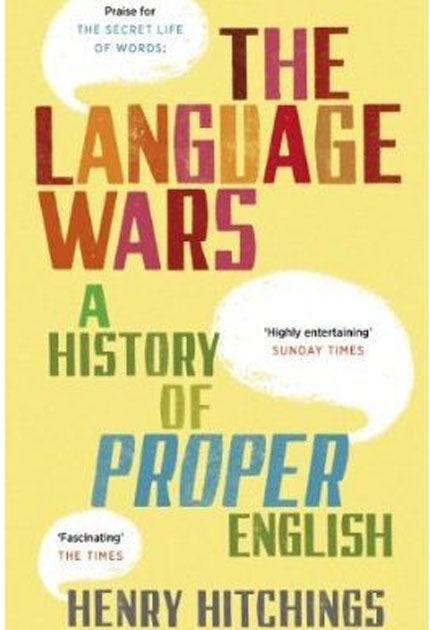The Language Wars: a history of proper English, By Henry Hitchings
Wordsmith who's on the winning side

The title of this agreeable and informative book is no exaggeration: language is indeed a weapon of war. According to the Old Testament, the Gileadites identified enemy Ephraimites, who had a problem with the "sh" sound, by commanding them to say "shibboleth". Pronouncing it "sibboleth" led to detection and death. In the Second World War, US soldiers distinguished Japanese spies from friendly Filipinos by their enunciation of "lollapalooza": "rorraparooza" was the wrong answer.
Henry Hitchings begins The Language Wars by reassuring us that there has always been skirmishing between those who think language has gone to the dogs and, well, the dogs. This complaint goes back at least to the first century BC, when Dionysius of Halicarnassus bemoaned the mauling of his native Greek.
In 1891 the future President Hoover needed a crash course in remedial English before admittance to Stanford University. Sadly, the catch-up course at Yale must have been full when young George W Bush applied, to judge by his later linguistic problems: "Is our children learning?"
To radical writer William Cobbett, language was a weapon in class war. To give working folk a chance to fight back, he wrote for them A Grammar of the English Language. However, he also recommended that you should bang out the first words that came to mind, which rather rules out any careful checking with the Grammar Police.
Intriguingly, Jonathan Swift had a similar line. He asserted that uneducated rustics spoke well because they were uncorrupted by the fads of urban trendies. He argued for the setting up of an English Academy that would ban "monstrous" words and give a seal of approval to correct ones. Daniel Defoe also proposed such a body of wise wordsmiths. Just as we are not permitted to make our own money, so wordsmiths would not be allowed to create their own words.
Hitchings himself minds the language of consultant-speak such as "wrong-siding the demographic". No one, he shows, is perfect. Not even Lynne Truss. The princess of punctuation is alleged to have committed a colon atrocity in Eats, Shoots & Leaves. It's what we management consultants call an ongoing who-guards-the-grammar-guards situation.
Join our commenting forum
Join thought-provoking conversations, follow other Independent readers and see their replies
Comments